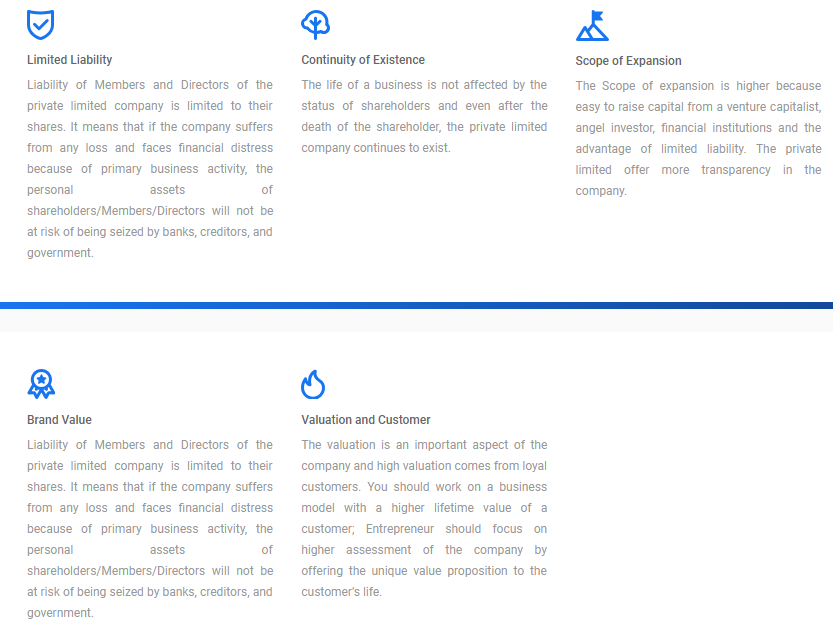Procedure of Company Registration
There is a rise in the number of startups in Indian Economy. One can establish a business choosing any business model like sole proprietorship, partnership, LLP or a company depending upon their business model and number of promoters. Many prefer to incorporate a company as it provides various benefits like limited liability, perpetual succession, separate legal entity etc.
There are different types of companies like;
• Private Limited Company
• One Person company
• Public Limited Company
• Nidhi Company
• Section 8 Company for charitable purpose etc.
Companies can also be categorized as;
• Company limited by shares
• Company limited by guarantee
With an objective to promote the corporate culture and keep track of the market players the government has taken various steps and initiative to make the company registration process easier. Earlier this year this process was further simplified. In this article we will discuss about procedure company registration in India.

Company Registration Procedure
Anyone willing to incorporate a company in India has an option to choose from any of the below mentioned options;
1. Incorporation after name approval
2. Direct incorporation
We will discuss both the alternatives here.
Incorporation after name approval
It is recommended to incorporate a company only after company name registration. For name reservation Reserve Unique Name (RUN) Service is available on the Ministry of Corporate Affairs portal. The applicant is required to apply with two unique names. Once a name is approved it is reserved for a period of day only.
The applicant is required to file SPICe form for incorporation within 20 days of name allocation. It is required to be submitted as a linked form along with SPICe AOA and SPICe MOA.
Direct incorporation
The other option is to file for incorporation through SPICe Form without name approval. Following mentioned all the services are covered under SPICe Form;
1. Name Approval
2. Company Incorporation
3. DIN Allotment
4. PAN Allotment
5. TAN Allotment
6. Registered Office Registration
Source by https://enterslice.beep.com/procedure-of-company-registration-2018-08-22.htm
Registration of A Private Company in India
In case you wish to register a private company, it must be registered under The Companies Act 2013. To incorporate a company one need to have 2 directors and shareholders (both can be the same). However one of the directors must be resident in India. The compliance part in the private company is less as compared to a public company, hence it is usually recommended to start with the private company. As opting for Private Company shall limit the Liability to an extent when compared to liability in the Public company, the usually private limited company is preferred Incorporation of Private Company:

The process of registration for the Private Company starts with firstly
applying for name approval on MCA Portal by Clicking on RUN (Unique) whereby
maximum 2 names at a time can be proposed and fees of Rs 1000/- is required to
be paid. The name reserved shall be valid for 20
days from the date of approval of Name. However,
in case of name approval for existing company (Change of name), the approved
name shall be valid for 60 days. Thereafter fill in the application for
incorporation SPICE INC 32 form along with DIN application for Directors
(Maximum 3 Directors), ROC registration, PAN/TAN application of the company.
Yes this single form itself can be used for many purposes as stated. The
details of Subscriber can be given of maximum 7 subscribers. To detail about
more than 7 subscribers, physical signed copy of MOA and AOA is to be filled.
After the incrustation of the application Incorporation certificate shall be
generating with CIN, PAN & TAN..
Source by: https://enterslice.beep.com/registration-of-a-private-company-in-india-2018-08-18.htm
Registration Process of Copyright
The copyright
registration is obtained by those who are willing to protect their
dramatic/literary/musical/artistic/musical and artistic works/cinematography or
sound recording or as the case may be against
being copied or used by the third party, other than
inventor or owner of the invention. In other words,
a copyright provides you the right of
reproduction, communication to the public
at large, translation and adaption of the work.

In order to register the copyright,
one need to apply to the DD or the IPO, thereafter a Dairy number shall be issued,
within 30 days of which objections shall be invited vied the publication in
case there is no objection. Thereafter it
shall be scrutinized by the examiner, and
if no discrepancy found registration shall be approved.
However in case objection is received the letter will be issued to the
applicant and the objection raiser and hearing shall be held , basis which the application shall be accepted or rejected , if
objection is rejected it will move to the
next step wherein it shall be scrutinized
by examiner, in case discrepancy found ,
discrepancy letter shall be issued and reply of applicant is awaited, followed by hearing, if all goes well then registration is approved otherwise
application stands rejected. On approval
extracts from the register is sent to the applicant.
Source by: https://enterslice.beep.com/registration-process-of-copyright-2018-08-17.htm
How to Enroll Private Limited Company
What is meant by the company?

- The shareholders are the owners and directors, who run the business.
- The directors owe the limited liability towards the shareholders and members.
- A private company can have a maximum of only 200 shareholders.
- Obtain the DSC-Digital Signature certificate for the directors and such required personals who may require to sign on documents of the company.
- Apply for DIN (Director Identification Number) for the directors.
- Thereafter check the name availability for the company. The application fees for name availability check is Rs 1000/- for one time, propose two names with preference.
- Fill in the Form SPICE-32 for the application to incorporate the company.
- The MOA and AOA are required to be uploaded in SPICE-32, thus prepare the memorandum of Association and Article of Association of the company basis the object with which it has formed.
- The last step shall be to apply for PAN and TAN for the company.
Why Company Registration and Its Need
Did you ever think about why we need company registration if the company is made by you and services are also offered by you than everything about your services and products is dependent upon your Company than what is the need of Company Registration
Incorporation of Private Limited Company and Business means your business is registered under Companies Acts according to your company services and products your Business License is Approved by the Country Government to Legally do Business and to make transparency between your business and govt. because according to Government Guidelines you have to follow the Systematic rules and Regulations that is known as Management Principle of Business because if you are running a company it means your company have an employee As According to the Companies Acts you have to fulfill all the terms and conditions to get Business/Company License to run the business.
Need to Register your Company
Sometimes you have started a business with an idea to give your values and services as a small scale business person E.g. If you are running a business with 10 employees and continuously you are growing and now you form a Company but still, you don’t Register Your Company in the knowledge of Govt. but somehow if you get caught by the govt. without license and registration, you are running Company than you’ll be Fined maybe get Blacklisted.
So, Private Limited Company Registration is Framework which authorizes you from Govt. to do business and run a company Legally Enterslice helps you to register your Company under the Companies Acts and Government Guidelines which fulfill your business services and products.
Source by - https://enterslice.weebly.com/blog/why-company-registration-and-its-need
FSSAI Registration for Fine Dining Restaurant
A fine dining restaurant is characterized by high-quality food with a choice of Indian and Western cuisines and
attractive dishes to choose from, it is a sit-down or a formal type of lunch
and dinner, caters to premium and niche clientele and employs some of the best
chefs and employees from the industry. Opening a fine dining restaurant
involves investing in the best of everything and hence requires a handsome
investment.
One of the primary registrations as a food operator, the promoters/owners of the restaurant need to apply and procure the food license under the Food Safety Standards Act, 2006. The FSSAI that works under the Ministry of Health and Welfare is responsible for ensuring that each and every Food Business Operator (FBO) in the country follows norms related to food safety and hygiene. It also ensures that consumers and other stakeholders in the country are informed from time to time on the safety and hygiene standards so that they can make informed decisions while choosing food for consumption. The FSSAI license is a way of communicating to the customers that the food has been prepared and handled in a safe and hygienic manner.

The Food Safety Standards and Authority of
India have set down rules clearly
demarcating between the three different types of FSSAI licenses
that apply to different FBOs in India.
A.
The basic FSSAI license or registration is
applicable for small-time food operators
with annual returns less than Rs. 12 lakh annually.
B. The
State FSSAI license is needed to be procured by FBOs whose turnover falls
between Rs. 12 lakh to Rs. 20 crores.
C.
The FSSAI Central license
is applicable for business units that are earning more than Rs. 20 crore
annually.
For business units, involved in dairy products,
vegetable oil processing and other food processing units, normal storage units,
cold storage units, atmosphere controlled storage facilities, wholesalers, food
vending agencies, transporters and hotels have production/storage/turnover/number
of vehicles related parameters to determine their eligibility for procuring
either the State or the Central license.
A fine-dining restaurant will invariably fall
under the state or the central license categories. For issuing both these types
of license, the concerned authorities will first physically inspect the
premises of the FBO and accordingly grant the license. The food is also tested
on a routine basis at FSSAI Notified food
testing laboratories that are accredited by NABL (National Accreditation Board
for Testing and Calibration Laboratories).
In establishing a Fine dining restaurant many
other formal registrations are required. Following is a list of few such
requirements;
1. Initially, the
business is required to be registered. If you are operating alone then sole
proprietorship or one person company are the obvious choices. However, if you are planning it with your
partners then an LLP or private company
can be set up.
2. GST
registration is to be applied for. if you are not planning to serve liquor in
the restaurant then you can also register as a composition dealer under GST.
3. Trade
license along with NOC from fire and other concerned departments is required to
be applied for.
4. Registration
under Shop and Establishment Act is also mandatory.
5.
You can also apply for MSME registration as it
ensures added benefits.
FSSAI Registration Requirements for Fast Food Joint
At
a fast food joint, a customer gets to buy fast food – one that requires minimal
time in preparation of food and a nominal
amount of service at the tables. The
ingredients of the food are usually stored in the frozen, preheated or
precooked format and hence are served quickly in a packaged form that is easy
to eat at the joint or take-away. Since
it is a type of restaurant and deals in the manufacture,
storage, sale and distribution of food, the joint has to be licensed by the
Food Safety Standards and Authority of India (FSSAI).
The
FSSAI license is a
fourteen digit number that provides information about the food operator’s
license or registration. This number is divided into 5 parts – first digit
indicates that the FBO is a registered license holder; the next two digits
indicate the state code; the next two digits indicate the year of registration
with FSSAI; the next three digits denote the registering authority and last 6
digits stand for the FBO’s license/registration number.

As
a food manufacturer, a fast food joint has to either take
the FSSAI Central license or the state license depending on the
expected turnover of the business annually. In case the food joint is present
in multiple locations in India in different states, then the state license
needs to be procured from the respective state licensing authorities. In this case, the central license is also required
because of its multi-location presence.
As
per FSSAI regulations, the fast food joint needs to put up the license number
on a Food Safety Display Board in the premises of the joint. Along with the
license number, the board also requires to detail out 12 golden rules
prescribed by the FSS Act, 2006 for
restaurants that pertain to observing
hygienic practices within the premises of the joint.
Registering
for the license for the first time can be done online from FSSAI website direct
by filling out Form B. The supporting documents that are required to be
submitted are – Aadhaar and PAN card details of the owner; passport size
photograph of the owners; utility bills as proof of ownership of the premise or
lease agreement in case of rented property. The license fee also needs to be
deposited along with the form and documents. Once the validity of the license
nears expiry, the owner needs to renew the license.
Along
with the establishment will also require other licenses
and permissions also like Trade License
from the Municipal authorities of the area, registration under shop and establishment Act etc.
Ice Cream Parlour- FSSAI Compliance
Opening an ice-cream parlour means one can either take the franchise of one of the branded ice-cream chains or start an independent parlour. The ice-cream parlour is undoubtedly going to face competition from the roadside ice-cream carts that sell branded ice-creams. But an ice-cream parlour is surely going to attract attention soon – firstly because of the luxury of being able to sit and enjoy the sweet delicacies at the parlour; secondly, because there are lots of options for the consumer to choose from and thirdly because the parlours take home delivery orders too.

Since this type of outlets deals in food –manufacture, storage, sale, and distribution – it is mandatory by the rule of the land to obtain the FSSAI license from the Food Safety Standards and Authority of India. The head office of this statutory body is in the national capital and it has its branches at the state level.
Applying for the applicable FSSAI license/registration involves:-
a. Understanding the expected turnover of the business.
b. Identifying and accordingly applying for the correct license/registration type online and submitting the mandatory documents and fees.
c. The license/registration is issued after going through an inspection process.
Generally, the license is received within 60 days after due completion of the documentation and inspection process but if the license/registration is still not received; then the promoters/directors can start operations without waiting to receive the license/registration.
The FSSAI registration is not awarded for a lifetime. It expires after a period of time which generally extends from one to five years. It applies to all the three types of FSSAI registration – Central License, State License, and State registration.
If the business plan of the ice-cream parlour is to cover different states of the country or even export abroad, then the Central License has to be obtained on a compulsory basis. In the former case, the promoter/director needs to apply and get an individual license from respective state authorities. For the latter case, only the central license is enough. However, if the ice-cream parlour is to operate only in a localized region and has proposed an annual turnover of Rs. 12 lakh or more, only the state license is enough. On the other hand, if the proposed return is less than Rs. 12 lakh then the state registration needs to be obtained.
Along with FSSAI registration, the following registrations are also required:-
1. Business registration either as an LLP, company or partnership firm depending upon the requirements.
2. Registration under shop and establishment Act for the work premises.
3. GST registration for the business is also to be acquired.
4. You can also apply for MSME registration. However, this is not a mandatory registration but entails various benefits for the organization registered under it.
Private Limited Company Choices of Business Tycoons
As on
average scale Private Limited Company Incorporation in India is registered maximum as compared to other companies
type Registration that result is surveyed by the Enterslice (Award Winning CA
and Legal Technology Company) Technically this all depends upon need of the
Company Directors As we know there are several factors based on companies
formation after dealing all this we get the best result on which type of
company Registration you need.

Private
Limited Business Formation
Business Formation is same as company registration in which you have to take Authorization from Govt. for the Business that is a process of register your business under certain Acts and Laws of Government Guidelines for this, there is Enterslice Stand for you for Company Formation and Registrations.
Business and Growing Day by Day as on Alarming Rate just because of to make this world “Smarter Faster and Better” here Entrepreneur, Tech Geeks, and Business Tycoons Firstly go for Company Registration i.e. PrivateLimited Company Registration because normally its take time around 7-10 Working Days Maximum.

FSSAI Compliance for Sweet Shop
A
sweet shop can be started in two ways – (1) preparing the sweets in the shop
premises and selling them or (2) working as a re-seller which means that the
sweets are prepared by another business entity and you sell them on their
behalf. Either ways it means that the business needs to have the capacity to
prepare/stock-up and deliver in bulk as sweets are popular dessert items in
India. One important thing to remember is that the item is perishable by nature, so the business needs to
be aligned accordingly.
One
of the keys and foremost licenses that
need to be procured for either of the cases above is the FSSAI license from the
Food Safety and Standards Authority of India. FSSAI is an independent statutory
body that was formed under the Food
Safety and Standards Act, 2006. The body reports into the Ministry of Health
& Family Welfare, Government of India.

The
basic purpose for creating the license is to ensure the manufacture, storage,
distribution, sales and import of safe and wholesome food that can be consumed
by human beings. The FSA functions in a
way so as to guarantee and regulate that scientific standard are used for
handling food items whether it is manufacturing, storing, distributing or sale
of the item.
The process of obtaining the FSSAI license
If
the sweet shop is a local shop limited to only one state or location and the
proposed annual turnover will not be more than Rs. 12 lakh, then the owner
should apply for the FSSAI Registration State License.
This license is applicable for a medium-sized manufacturer, storage unit,
distributor or marketer that is issued by the State Government. The license can be applied for a minimum
period of 1 year and a maximum of 5
years.
1.
The
FORM B needs to be submitted to the State licensing authority as per the FSS
Act.
2. The application needs to have a
self-attested declaration signed by the promoter/director/owner that the unit
shall conform to the Food Safety and Standards Act and
follow all the rules and regulations pertaining to hygiene and sanitary
practices.
3. The required documents and the fees
also need to be submitted simultaneously.
4. There will be an inspection at the
sweet shop.
5.
The
license is issued within 60 days.
The
FSSAI License/Registration number needs to be displayed at the premises of the
sweet shop using the FSDBs (Food Safety display Boards).
Documents Required for Registering a company in Hong Kong

For a “simple” company registration in Kong Kong, which should be enough unless you have specific needs, your agency will have to register a company in hong kong online (or E-registration, it takes about two hours to complete it), to get the certificate of incorporation (certificate of incorporation) and business license (business registration certificate) after verifying your identity through a Skype interview.
Or, if you want to open a multi-level company (which, as mentioned, is only needed in special cases), you will receive several pre-compiled documents from the agency (the “Form NC1 (Incorporation Form)” and the “Memorandum and Articles of Association, ”) so that both directors and shareholders can sign and send them back to the agency.
That’s all! The whole process should to open the company should last about five working days (but the agency will do most of the work).
Company Registration in Hong Kong – Formation & Stability
1. Why Hong Kong for Business?
Hong Kong consists of types of business which are:
a) Limited Liability Company
b) Sole Proprietorship
c) Partnership
d) Foreign Company Office

2. Company Registration & Formation
3. Procedure for company registration in Hong Kong
You have to choose 3 names out of that 3 names you get one (1) company name.
Be careful while choosing Company Name because Company name is the Identity always choose a name which is kindly related to your product because of its share meaning.
4. How to Grow & Stay in Business
Every Business and Companies are Stands on four principles that’s are-
b) Organizing
c) Leading &
d) Controlling

b) One shareholder of any nationality
c) One company secretary
d) No capital investment required
e) Minimum one share to be issued ($1 HKD=1share)
Source By - http://enterslice-ites.strikingly.com/blog/company-registration-in-hong-kong-formation-stability
Offshore Company Registration in Hong Kong through Enterslice

Although Hong Kong is politically a part of China, its legal system is actually different from China because British laws prevail (the reason is that Hong Kong has been a British colony for more than a century). Hong Kong is, together with Singapore, the most liberal economy on the planet. Opening a company is simple, fast and affordable (the government requires only HK $ 1,730 for company registration in Hong Kong and HK $ 2,250 per year for business certificate). Anyone can open a company in Hong Kong without having to live there or be a citizen (provided you use an agency).
5 Guidelines Required For Company Registration & Mistakes Should Avoid
1. Meaning of Company Registration:
As you know that Company Registration is an Enrollment or Registration procedure in which you’re Business, Companies, Enterprise and Firm are registered by the government under the Companies Act, 2013 and the Companies Incorporation Rules, 2014 with the Acts and Laws of Country / State Government Guidelines.

2. Mistakes Every STARTUP & Entrepreneur have to Avoid:
Choose Company Name Carefully because the company name is your brand or product domain through which you make your identity in the Market because if you choose an exclusive name that’s quite impressive for your clients to explore and promote your brand through your company name.
First Impression is the Last Impression that’s quote share meaning for your company name.
So, Company name has to show and share the meaning which is related to your services or product.
3. Provide Exact Company Details i.e. True:
Some of the Entrepreneur and Startup are starts their business without getting Company Registration because they thought they are not in the eye of government or internet just to save tax and stay from others trouble of company registration.
b) Limited Liability Protection
c) Reduce your taxability
d) Legally Business is running
e) Avoid Conflict between directors and co-directors
f) Easily you hire an employee

Choose your Service Provider with the Analysis of Company Background Details their clients and check their Google Business Listing Review and Glassdoor Review.
Sourceby-http://enterslice-ites.strikingly.com/blog/5-guidelines-required-for-company-registration-mistakes-should-avoid
For Starting a Business | Company Registration in India
For
starting a business, one has to select a structure it shall be operated in. It
can be a sole proprietorship, Partnership or a Company. The selection must be
made after scrutinizing the pros and cons of the structure and type of
business. Example- an individual, who wants to operate alone, has an option of
sole proprietorship and One-person Company; a group of individuals who want to operate
without forming any legal entity have an option to form an LLP or partnership.
Though
it is hard to argue that if a business has to be started with an aim to expand
in the future and have stability in operations, the structure best suited is a
Company. Thus, for those having long-term plans which involve a good amount of
investments, registration as a company
is the best option.

What is the procedure for company
registration?
1. Obtaining
the Digital Signature Certificate for all
the proposed directors which will be required to file the application for Private Limited Company Formation in India, return filings, ROC compliances etc.
2. The proposed name can be reserved for company registration either through
a. Reserve Unique Name (RUN) service on the MCA portal, or
b. Along with SPICe form, as explained
in the next step,
3. Simplified Proforma for Incorporating Company Electronically
(SPICe)- this form integrates 5 different services being Name Reservation,
Allotment of DIN, Incorporation of New Company, Allotment of PAN and TAN.
4. Then the Registration Certificate shall be issued along with
CIN, PAN and TAN.
1. Memorandum of Association and Articles of Association,
2. Affidavit and declaration by first subscriber(s) and
director(s)
3. Proof of office address - A
conveyance/lease deed or rent agreement with receipts and NOC, whichever
applicable along with copy of utility bills.
4. PAN card, proof of identity and
address of all directors.
Company Registration & Formation in America – Advantages, Types, Documents & Procedure
Definition:
Company Registration in the USA is an Enrollment activity through which your company is registered under the Acts and Laws of the USA government guidelines that allow you to run and grow your business legally in a specified manner.
Private Limited Company registration is the authorize pattern and option for businesses in the countries. It can have a minimum of two and a maximum of fifty members.
· To establish a company in one or several states of the country. While registering a company in the United States, it is mandatory to take into account that the country has a two-tier taxation system, which consists of state and federal taxes.
b) Limited Liability Company (LLC).
c) Corporation (Corp) - Corporation.
Formation of Corporation in Two ways-
a) Standalone entity: a corporation which is owned by the group of founders, employees, investors and another stakeholder as the separate entity from the existing company.
· Easier to get a visa to work and Visit in the US.
· Possible you can reduce your tax on US-source income.
· Easy to establish a business in The USA i.e. the world of Market.
· Protection of US law
NOTE: Enterslice provides Company Registration in with few steps so just know about the procedures and more information be in touch with us.
Business Registration in Bangalore | Pvt. Ltd Company Registration

Private Limited Company-Online Registration | Uses and Benefits
Definition:
Private Limited Company Registration is the Enrollment activity through which your company is registered under the acts and laws of country government guidelines that allow you to run and grow your business legally in a specified manner.
Required Member:
Private Limited Company registration is the authorize pattern and option for businesses in the countries. It can have a minimum of two and a maximum of fifty members.
Benefits:
· It is cooperative and has limited liability
· Absolute capital presents and highly solidity
· Probability to enhance business.
Company formation Process:
1. Digital Signature Certificate (DSC)
2. Director Identification Number (DIN)
3. Name Search- TM
4. Final Incorporation via Spice and CIN
Advantages of Private Limited Company Registration:
Liability of Members and Directors of the private limited company is limited to their shares.
The life of a business is not affected by the status of shareholders
The Scope of expansion is higher because easy to raise capital from a venture capitalist, angel investor, financial institutions
Liability of Members and Directors of the private limited company is limited to their shares.
Note: Enterslice provides Private Limited Company Registration within 7-10 days.
Enlistment & Formation of Company Registration in Mumbai

Purpose & Benefits of Transfer Pricing in India
Transfer prices in India are payments for goods and services between controlled (or related) legal entities within the enterprise and is the main tool for avoiding corporate tax while in India transfer pricing is a method of distributing profit (another formula distribution) used for the attribute of the net profit of a multinational corporation (or loss) before taxation in the countries where they operate. Transfer of the output of pricing when setting prices between departments within the enterprise.
Services for Transfer Pricing in India:
>Representation transfer pricing assessments of an officer or transfer pricing tax assessment authorities or appeal bodies in part of India.
>Transfer help to pricing documentation.
> Audit, consulting and consulting services.
> Research and analysis.
> Court support practice

Transfer Pricing in India is the sale of goods or services by interdependent persons on intra-firm, different from market prices. They make it possible to redistribute the total profit of a group of persons in favor of persons in lower taxation states.


